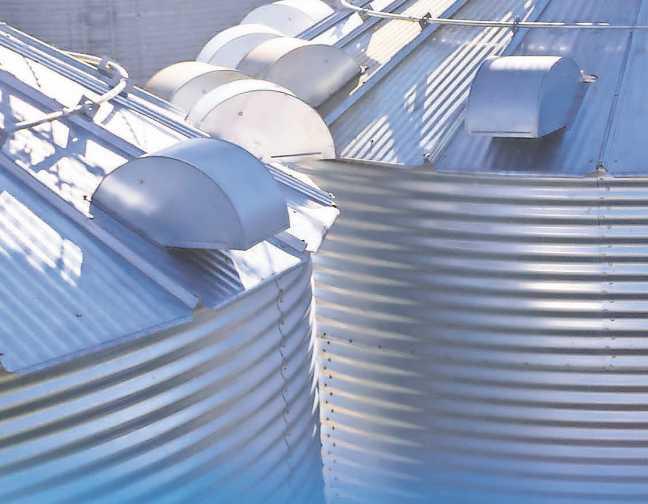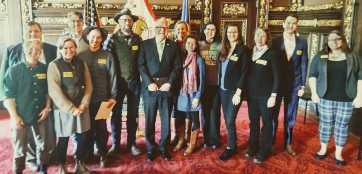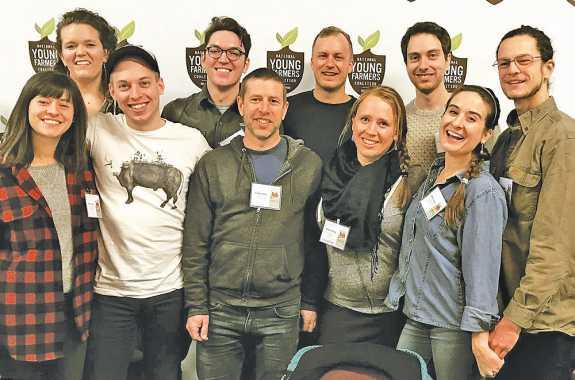
9 minute read
Table Talk
and I quickly learned my own limitations after witnessing that birthing strategy out in the farrowing house.
There had been a lot of stinky and uncomfortable jobs for us over nearly three decades of raising hogs back in the 1980s, ‘90s and early 2000s — during the early years of our marriage and while our children were growing up.
Advertisement
There were hog loading days when the dust created a fog in the lean-to. There were hot, humid days when we had to go out and spray the sows down several times a day. And days when we had to power-wash the farrowing house after the farrowing cycle.
It was a day when singing opera while you worked was a very bad tasting idea.
There were days of grinding hog feed when the sub-zero weather made it such a miserable job; and days when the hogs escaped their confines — creating an all-out family emergency. (When we got some four-wheelers around, that job became considerably easier; but nonetheless, we hoofed it for many years behind hogs that were The truth is, there are more pigs in Iowa than there are people.
For some of us, there are times when we have a hard time discerning who are pigs and who are people. But that’s a conversation we’ll have another day.
My dad was a pork producer. It used to amaze me as a kid when I would see him clean out the hog waterers — scooping out green scum, hay remnants, straw, weeds or whatever else landed in there — with his bare hands. And after the pigs had been drinking out of it. Yeesh. Being all grown up now, I know that wasn’t the worst thing Dad probably ever had to do while raising pigs. I have laughed at my husband over the years about his near-inability to change a dirty diaper. But on the other hand, as a pork producer who ran a farrow-to-finish operation, he was able to be up to his elbow in the back end of his sows and gilts, pulling pigs.
I would have been passed out on the floor if had to do that.
We all have our gifts and talents, TABLE TALK By Karen Schwaller
on the loose.)
There was cleaning out the barn with a shovel or skid loader; cleaning out the flooded barn after someone left the hydrant running (disclaimer: this example may or may not blatantly expose my faultiness). There was going head-to-head with territorial sows and boars and having the wisdom to know they really did run the show — although you couldn’t let them know it. There were fences and pens to fix, water lines to repair, and in one instance at our farm, when an entire nursery full of young pigs had to be hauled out one at a time and left for the rendering truck because of some mysterious overheating malfunction that happened overnight.
It was gut-wrenching to see, let alone think about the cash flow issue that was coming.
One day, as my husband and I were talking about our farm story, he said he couldn’t remember when we stopped raising pigs. One of our sons chimed right in. He said, “We (he and his brother) were freshmen. I remember it well.”
Well of course he remembered. What kid wouldn’t mark that as a national holiday?
And for all the times we’ve had a love/hate relationship going on with our herd, it was a sad day early-on in our marriage when the last of our hogs left the farm during a financially tough time for a beginning farmer in the 1980s — a time when so many were struggling.
That Christmas, Dad and Mom provided the net underneath of us. They let us take home some of their bred sows to farrow, asking only that they got the sows back. We could keep all the piglets. That act of compassion and kindness got us back into the hog business.
It was a Christmas miracle that no amount of bacon-love could equal.
So the truth about pigs is, we can love them or we can hate them. But a world without pigs would mean there would be more people in the world than pigs. And I’m not entirely sure that would mean a nicer world overall. And … there would be no pig swagger to teach us confidence.
And there would be no bacon. And a world without bacon would just be wrong.
Karen Schwaller brings “Table Talk” to The Land from her home near Milford, Iowa. She can be reached at kschwaller@evertek.net. v
We need your subscription card
No Gimmicks - No Games We like to keep your seed buying experience simple


Visit website or give us a call www.andersonseedsmn.com • 507-246-5032
The 2020 subscription card for The Land was inserted in January’s issues. If you haven’t already sent it back, please do it soon. If you misplaced your card you can call the office at (507) 345-4523 to request a new one or you can fill one out online. Visit our website www. thelandonline.com. $400 drawing — On March 6 we will draw from all the subscription cards we have received in 2020 and one lucky subscriber will win $400!
Thank you for reading The Land. We appreciate your support!









opportunities for farmer to farmer interaction on the local level.
“We host potlucks at each others’ farms during the growing season as folks are able,” Sannerud said. “When we gather at each others’ farms, we share a meal, socialize, and take a farm tour at some point during the visit. This year we intend to also spend time working as a group on a project of the host farm’s choosing during out potluck meetings. The idea is for us to learn more about how individual members operate their farms and to help each other out.”
Although most members of the Coalition fit the conventional definition of “young,” their actual definition of a young farmer is very inclusive.
“For our chapter, we see a young farmer as someone who has been farming for less than ten years, or is below the average age of a farmer which is currently 58 years old,” Sannerud said. “We welcome the young in experience and young at heart. The United States needs more farmers overall to replace those who are aging out, so by no means do we turn away folks who are interested in getting involved — no matter their age.”
There is no membership fee for the local chapter. However, members are encouraged to pay an annual $35 fee to support the National Coalition’s work. The Central Minnesota Young Farmers Coalition has a leadership team that is elected by the members. The leadership team prepares a schedule of events for the season.
For more information, you can reach Sannerud via email at cmnyfc@gmail.com or you can connect with the Coalition via Facebook at https://www.facebook. com/cmnyfc/. The Coalition’s next meeting is Feb. 20 at 6 p.m. at Back Channel Brewing Company in Spring Park, Minn. There are also Coalition chapters in the Duluth area and the Driftless region in southeast Minnesota and western Wisconsin. v increase funding for programs geared towards young and beginning farmers, Sannerud said.
In the past, the National Coalition has worked with the local chapter to host a Farm Service Agency loan workshop which gave an introduction to resources that FSA offers to young and beginning farmers.
“We had farmers who have used loan programs and other resources available through the Farm Service Agency, speak to the group,” Sannerud said. “And we had Farm Service Agency employees speak about the different programs they offer. We found many nonmembers came to this workshop because it is a resource that can be hard for a new or young farmer to access due to lack of understanding and experience with using these programs.”
The national organization also offers resources for navigating food safety regulations, crop insurance and finding farmland — in addition to publishing resources for organizing, reports on surveys filled out by young farmers, and guides to organic certification, according to Sannerud.
The local chapter provides members access to the resources of the National Coalition plus plenty of By TIM KING The Land Correspondent MILACA, Minn. — Young and beginning farmers face an obstacle course of knowledge, access to credit, land, and other resources established farmers don’t necessarily encounter. As a partial response to those obstacles, a group of young farmers formed the Central Minnesota Young Farmers Coalition in 2016. The founders raised a wide variety of farm products including livestock, row crops, hops, vegetable, and flowers. Although they didn’t have a lot in common when it came to the crops they grew, their common bond was their youth and recent entry into agriculture.
“Though there are many strong farm organizations around the state, of which our members are also active in, we felt that none offered focused advocacy on the particular challenges we face as young farmers, or space to gather and build community among young farmers,” Rachel Sannerud, the organization’s current president and a flower farmer from Milaca, said. “We wanted a narrowly focused organization that could serve our needs as a community, so it made the most sense to become a chapter of National Young Farmers Coalition, which is narrowly focused on young and beginning farmers’ issues.”
Sannerud, who joined the Coalition in 2017, says that through the Coalition she’s built a community of farmer friends and learned new skills while doing so. The new skills include growing her capability and confidence in grass roots organizing around issues of importance to young farmers.
“Some of the needs or issues we face as young and beginning farmers include access to land — both in its availability as well as its price,” she said. “We also have concerns about affordable housing, health care, climate change, and access to resources such as loan programs, capital, equipment and markets.”
Part of the grass roots organizing and advocacy that the Central Minnesota Young Farmers Coalition does included a 2017 lobbying effort for Minnesota’s Beginning Farmer Tax Credit.
“It was passed by the legislature!,” Sannerud said. “The Minnesota Beginning Farmer Tax Credit provides tax credits for the rent or sale of farm land or a variety of farm assets to beginning farmers. It is a big asset for young and beginning farmers looking to gain access to land and equipment.”
The Central Minnesota chapter is a member of the National Young Farmers Coalition. On a national level, the National Young Farmers Coalition lobbies for reforms to the federal Farm Bill to provide or Photos submitted Members of the Young Farmers Coalition gathered at the Midwest Organic and Sustainable Education Service (MOSES) conference last February. Coalition members attended an FSA loan workshop in 2017 at York Farm in Hutchinson, Minn. Members of the Young Farmers Coalition met with Minnesota Governor Tim Walz and Ag Commissioner Thom Petersen during the group’s “Day on the Hill” earlier this year.








